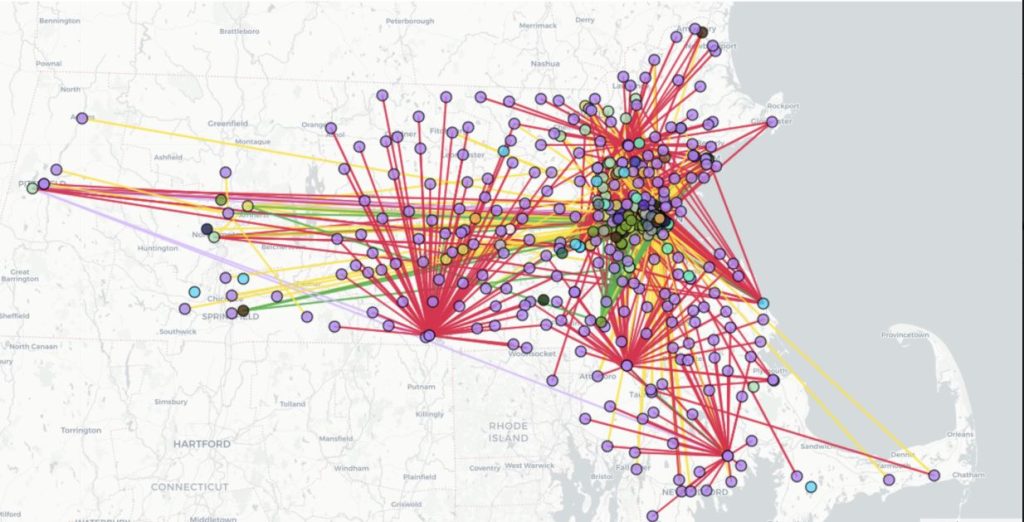Below is a quote from: Antisemitism and the Left: Confronting an Invisible Racism Sina Arnold & Blair Taylor
Journal of Social Justice, Vol. 9, 2019
https://transformativestudies.org/wp-content/uploads/Blair-Taylor-and-Sina_Arnold.pdf
The double standard of salience translates into a political context where the left assigns vastly more attention and importance to the issue of Israel/Palestine than any other conflict in the world today. Israel is one of the few issues that unites a typically fractious left. This one conflict is so central to the U.S. left’s self-understanding that that it is often a highly visible element even in demonstrations for completely unrelated topics like climate change, police brutality, or gay rights. This ideological omnipresence suggests that the left views Israel as both a unifying factor as well as a political lynchpin upon which various other forms of oppression rest. Yet at the same time, various other occupations, civil wars, and violent conflicts receive little or no attention from the left–there are no sustained left campaigns targeting other contemporary examples such as India’s annexation of Kashmir, Turkey’s brutal suppression of the Kurds, Russia’s occupation of the Crimea or Iran publicly executing gays. This double standard is even more glaring for North American leftists who target settler colonialism in Israel while directly benefiting from its legacy at home.
The double standard of state foundation marks the foundation of Israel alone as artificial and violent, in contrast to the presumably peaceful and “organic” process of establishing other states. Because it calls for an end not only to the occupation but the very existence of Israel, antizionism has come to represent the obvious “radical” position on the left. Yet this radicalism rests on deeply liberal and ahistorical presumptions about the nature of nation-states. It assumes Israel is a uniquely violent exception rather than the more mundane rule.
ntizionism selectively ignores that every state in existence today is equally “artificial,” birthed and maintained by violence, dispossession, and exclusion.While the violence that accompanied the foundation of Israel is not unique, the late historical moment (as well as political context) of its establishment is. This brings us to the related double standard of state formation, which sees Israel as anachronistic, a colonial and imperial regime engaged in an outmoded form of colonial expansionism. Yet once again, this feature is not unique to Israel. Borders have been continuously redrawn throughout history to create new states. Thirty-four have been founded since 1990 alone, many of which were the result of civil war or land grabs lacking any legal legitimacy, as evident in the ongoing cases of South Sudan and the Western Sahara. Various existing states are also currently engaged in violent territorial expansion and the suppression of local populations – Turkey, India, Russia, Ethiopia, and Morocco, to name a few. State foundation and expansion are frequently accompanied by forced population transfers, yet the demand for the right of return for Palestinians is almost exclusively directed at Israel. Although this has been a persistent sticking point holding up negotiations for Palestinian statehood, it is rarely a condition for other partitioned states, for example India and Pakistan. Left discourse also seldom discusses the treatment of Palestinian refugees by other states like Syria and Egypt, or mentions the hundreds of thousands of Jewish refugees exiled from neighboring Arab countries in the wake of 1948. None of these examples serve as justification for Israeli crimes or any other occupation; rather the lack of attention and activism around them illustrates a profound double standard operating within left political discourse, one that happens to resonates with historical patterns of antisemitic exceptionalism.
The double standard of self-understanding results in criticizing Israel as a specifically ethno-religious state. Yet this position ignores that this fact holds true for several other states today, and for most in history. One would be hard-pressed to find leftists who criticize the specifically Muslim nature of the Islamic Republic of Iran or the Islamic Republic of Pakistan. Almost every nation in history was at one point linked to a state religion, and as of yet every nation enforces restrictive ethno-racial immigration policies. But it is only the Jewish state that is routinely criticized by the left for its specifically religious character and demographic manipulation. While leftists are right to reject both ethno-religious nationalism and restrictive immigration/demographic policies, they are far from consistent, criticizing some forms — U.S. and Israel, Christian and Jewish chauvinism — while ignoring or even rationalizing others — Islamic nations, Muslim, Hindu, Buddhist ethno-religious nationalisms.
Lastly, the double standard of self-determination results in acknowledging this right only for Palestinians. A wide variety of movements of Palestinian self-determination are championed by the left – regardless of political content – while Zionism is denounced as synonymous with racism and violence, equally oblivious to specificities of historical form or political content. This holds true more generally for the U.S. left’s view of the Israel-Palestine conflict as a whole; although this history is long and complicated, the double standard of selfdetermination results in an extremely one-sided and simplistic account. Palestinian dispossession and repression is very real, and as the stronger force Israel has the greater power and responsibility to resolve this conflict. At the same time, the left selectively ignores various important historical facts on the other side: that Jews also have historical ties to the region and their own history of displacement; the long subsequent history of persecution, exclusion, oppression, and expulsion, culminating in the Holocaust; that as a result of these historical oppressions Zionism as a national liberation movement and state-building project started late in the game and under historical conditions not of its choosing; the armed attacks on Israel – including civilians – from its inception until the present (Linfield 2019, Memmi 1973).
Despite this complicated history, most leftists primarily perceive Palestinian suffering, fear, and rage as legitimate. At times this translates into support for reactionary groups like Hamas or Hezbollah, despite their fundamentalist politics. By contrast, the feelings of fear, insecurity, and historical persecution among Jewish Israelis are hardly seen as legitimate. The left often portrays the rise of right-wing Palestinian political actors like Hamas as a regrettable but understandable reaction to violence, while the rise of Likud and Israel’s shift to the right are never interpreted as a bad reaction to anti-Semitism and violence against Jews. Although both groups are irredentist and predicated on their opposition to the peace process, the dominant left position is to only acknowledge this regarding Israel, refusing to admit there are those on the other side who will never accept peaceful coexistence with “the Zionist entity.” In a conflict where there has been trauma and loss of life on both sides, one does not have to equate the suffering of parties to recognize that resolution is impossible if it only considers the claims of one side.

Map produced by BDS activists of Boston showing the locations of Jewish groups in Massachusetts, including schools, community funds, and synagogues. https://www.timesofisrael.com/bds-movement-disavows-boston-project-mapping-jewish-groups/

Leave a Reply